The EJN Year in Focus: Terrorism, Hate-speech, the Refugee Crisis, and Looking Forward to 2016
Aidan White
It has been a testing year for journalism. It began with 10 journalists and cartoonists among those killed by terrorists in the unconscionable massacre at the offices of Charlie Hebdo in Paris. Within hours the EJN published an article advising journalists to defend free speech but also to lower the temperature, to eliminate hate speech and to avoid encouraging acts of revenge or abuse of Muslims. We called for “slow journalism” and for newsrooms to think carefully about how to handle the story.
The Paris events triggered much talk in media circles over free speech, self-censorship and ethical responsibility. And the EJN was at the centre of this debate. We published a second article urging journalists to rely on their codes and editorial traditions when reporting terrorism, to avoid propaganda traps set by media-savvy extremists and, above all, to tell the story with humanity.
It was a message we delivered to numerous media events in Paris (organised by UNESCO); in Brussels (organised by the Brussels Press Club and the European Federation of Journalists); in Florence at the European Centre for Media Pluralism; in Beijing and Tokyo, (with Chinese and Japanese journalists); in Delhi (at the congress of the International Association of Women in Radio and Television); in Cape Town (with the Organization of News Ombudsmen) and Dar es Salaam and Nairobi (with the East African Federation of Journalists); in Johannesburg (at the African Media Leaders Forum); in Riga (for World Press Freedom Day celebrations); and at other meetings in London, Oslo, Sarajevo, Kiev, Istanbul, Cairo, Ramallah, Hebron, Doha, Vienna, Missouri University, and Yangon, (during the congress of the International Press Institute).
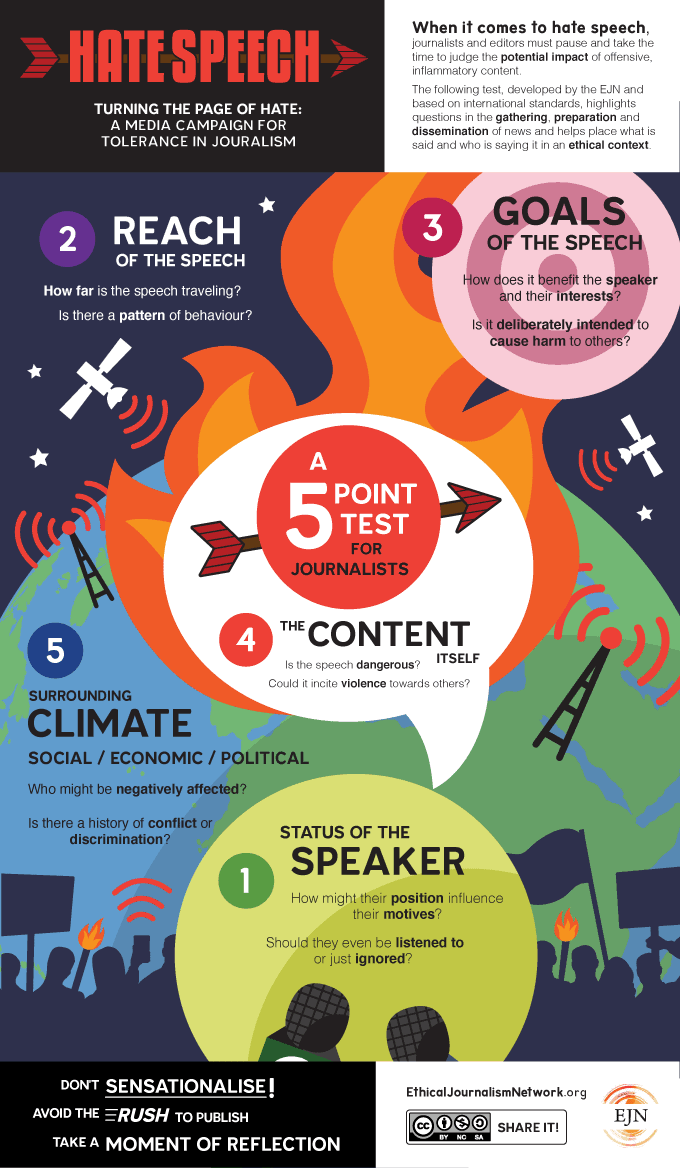 The context of intolerance and political interference in journalism is ever-present in our work. The theme was central to the programme we launched in Palestine with journalism teachers and media leaders. This ground-breaking project established a partnership between Palestinian media, universities, and the journalists’ union.
The context of intolerance and political interference in journalism is ever-present in our work. The theme was central to the programme we launched in Palestine with journalism teachers and media leaders. This ground-breaking project established a partnership between Palestinian media, universities, and the journalists’ union.
The Palestine work is part of our regional programme which this year has included work to help journalists in Syria to draft of a code of conduct and brought Arab media leaders together in Egypt in November to discuss the possibility of establishing Middle East media hub to counter hate-speech.
But even if hatred continues to create a long shadow over media work it is the global migration and refugee crisis that has provided the world of journalism with its biggest story and toughest test during 2015.
In April the EJN highlighted a shocking example of tabloid hate in covering the story. An article by Katie Hopkins, a columnist in Britain’s biggest-selling tabloid The Sun newspaper, called migrants “cockroaches,” a term of abuse used by Nazis and the architects of genocide in Rwanda. The column was roundly condemned inside journalism and from outside the newsroom by the UN High Commissioner for Human Rights. See the EJN response here.
Migration made the front page around the world in September with much focus on the tragic death of Aylan Kurdi, the child who drowned as his family fled the war in Syria and whose picture became an iconic image of the human cost of the refugee crisis.
The EJN (see here) examined the editorial dilemmas facing media – particularly against the backdrop of political challenges in Europe and elsewhere. We commissioned writers in 14 countries with the assistance of the Climate News Network and Statewatch, to review how journalists and media were covering the story.
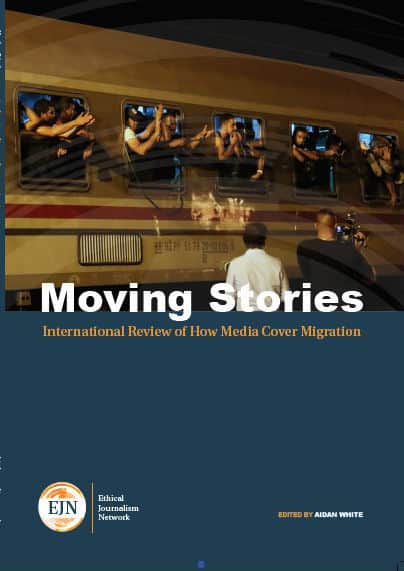 Our report, Moving Stories was launched on December 18th, International Migrants Day. The report has been widely welcomed and reveals that despite some powerful and well-informed coverage, many media fail to tell the full story and are often guilty of sensationalism driven by unscrupulous politicians and extremists.
Our report, Moving Stories was launched on December 18th, International Migrants Day. The report has been widely welcomed and reveals that despite some powerful and well-informed coverage, many media fail to tell the full story and are often guilty of sensationalism driven by unscrupulous politicians and extremists.
Much of the focus was on the millions of refugees fleeing war and conflict in Syria and Iraq and thousands risking their lives to enter Europe by land and sea, but we also looked at other aspects of migration – south to south population shifts in Africa and internal migration in China.
The report warns of the dangers when media coverage is politically led and when media follow an agenda dominated by hate speech, loose language and intemperate talk of invasion and swarms and it recommends news media to appoint specialist reporters to the migration beat; to provide more industry wide and in-house training; and to be ever-vigilant over hate-speech.
The migration story will remain in the headlines in 2016 and, as we pointed out at the launch meeting in Rabat, media face a continuing challenge to tell the story in a framework of facts, informed analysis and laced with humanity.
These were issues we also raised at the Asian Journalism Forum in Singapore in August which focused on the migration story including the plight of Muslim Rohingya refugees from Myanmar fleeing religious persecution. During the meeting the EJN organised two sessions, outlining the EJN’s 5-point test on hate speech to help journalists and editors to deal with incitement and intense hatred in the news.
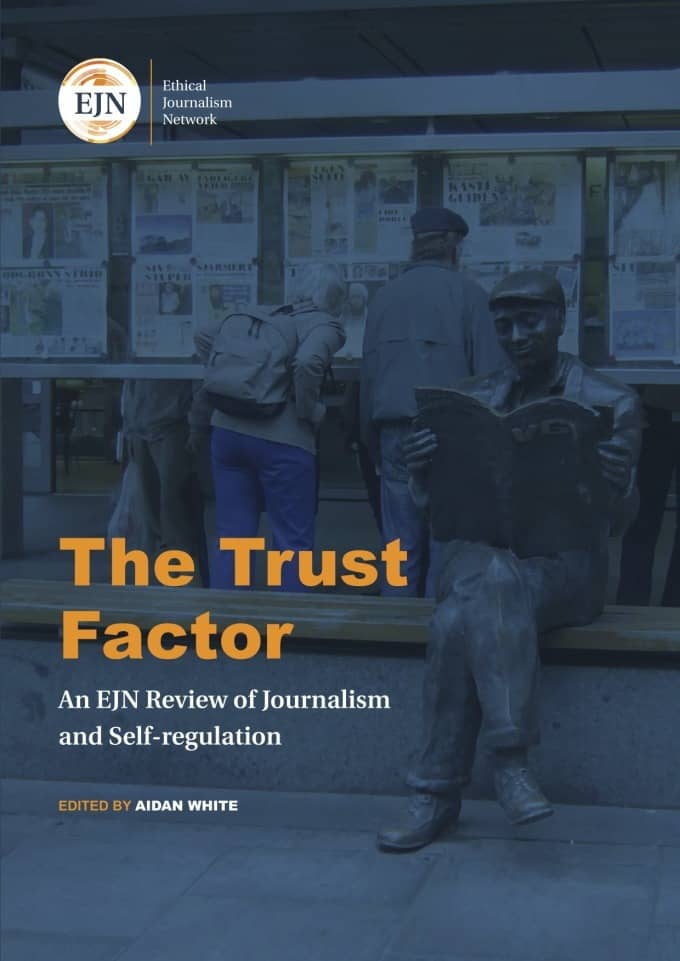 In 2015 the EJN launched two other reports: The Trust Factor, a 16-country report on self-regulation; and Untold Stories, covering 18 countries and which makes sober reading for anyone worried about the future of journalism. It confirms how paid-news, or advertising disguised as journalism, and a lack of transparency over political and corporate influences on news media are eroding standards.
In 2015 the EJN launched two other reports: The Trust Factor, a 16-country report on self-regulation; and Untold Stories, covering 18 countries and which makes sober reading for anyone worried about the future of journalism. It confirms how paid-news, or advertising disguised as journalism, and a lack of transparency over political and corporate influences on news media are eroding standards.
The EJN has strengthened its links with press councils and self-regulation groups during the year and next year we will launch a Western Balkans programme aiming to help media in Bosnia-Herzegovina, Serbia, Albania, Macedonia, Kosovo and Turkey strengthen self-regulation. We outlined the importance of this in a presentation at the Newsweek Media Summit in Belgrade in September where discussion focused on the battle for editorial independence in a hostile political environment.
In all of this we have been working closely with EJN supporters during the year and we have also been consolidating our own organization. In December the EJN Board meeting in London – a new leadership completing its first year of work – adopted new aims and objectives for the Network and a strategy to take our work forward.
In sum, we will continue with more of the same – strengthening our education work and helping journalists to confront the information crisis. We shall also work on providing new tools – web-based applications to help journalists as well as new teaching materials.
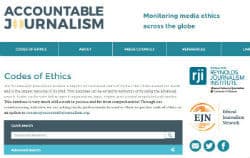 We made a start on this work in 2015 with the launch of Accountable Journalism, a groundbreaking web application that allows users to search our codes of ethics database by key words, organisation type, topic, region, year, and country. It is the largest database of its kind and has been developed in co-operation with the Reynolds Journalism Institute based at the world-renowned Missouri School of Journalism.
We made a start on this work in 2015 with the launch of Accountable Journalism, a groundbreaking web application that allows users to search our codes of ethics database by key words, organisation type, topic, region, year, and country. It is the largest database of its kind and has been developed in co-operation with the Reynolds Journalism Institute based at the world-renowned Missouri School of Journalism.
Most importantly, in 2016 we will launch a new initiative, Ethical Journalism for Free Expression. The campaign will underscore the importance of ethics and self-restraint in public discourse.
The aim is to promote the values of journalism and the importance of free speech by stressing that there is no contradiction between free expression and actions to encourage responsible communications.
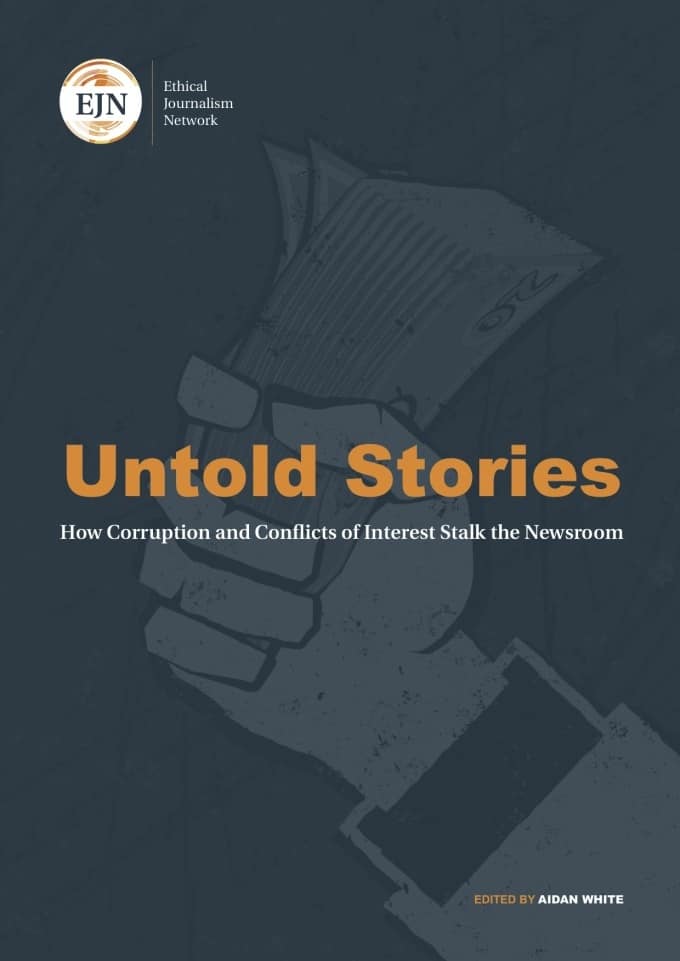 The cardinal values of journalism – accuracy, impartiality, humanity, independence and transparency and accountability – may not at all be appropriate for everyone involved in public communications, but three of these key principles arhttps://ethicaljournalismnetwork.org/assets/docs/220/136/92a87dc-d968188.pdfhttps://ethicaljournalismnetwork.org/untold-stories-time-to-act-over-the-corruption-that-is-killing-ethical-journalism?swcfpc=1e relevant: sticking to the facts; showing humanity; and being transparent. Even the need to correct our mistakes, the most difficult of journalistic obligations, can be developed as a cornerstone of communications for everyone.
The cardinal values of journalism – accuracy, impartiality, humanity, independence and transparency and accountability – may not at all be appropriate for everyone involved in public communications, but three of these key principles arhttps://ethicaljournalismnetwork.org/assets/docs/220/136/92a87dc-d968188.pdfhttps://ethicaljournalismnetwork.org/untold-stories-time-to-act-over-the-corruption-that-is-killing-ethical-journalism?swcfpc=1e relevant: sticking to the facts; showing humanity; and being transparent. Even the need to correct our mistakes, the most difficult of journalistic obligations, can be developed as a cornerstone of communications for everyone.
This work will open the door to new dialogues on improving the quality of public debate while at the same time strengthening the work and status of journalism. Just as important, it will help us encourage governments who worry about excesses in public communications not to use the law to control the web and to limit free speech.
We got the ball rolling in a series of public meetings jointly organised with City University in London in November and December 2015 and our participation in the European Union’s new Media Literacy Experts Panel. In 2016 we will expand this work. Co-operation is already planned with partners in Asia, Africa and the Middle East.
Meanwhile, we wish our supporters and all those who continue to strive to make the best of journalism best wishes and success for the year ahead.
You can read our reports from 2015 here:
BBC Podcast
Listen to Zakeera Sufi, the author of the UK chapter of the report, debate UK coverage of migration with media commentator and The Daily Mail columnist Stephen Glover, who is also a columnist for The Daily Mail on The Media Show on BBC Radio 4.
Photo 1: Flickr CC Gertrud K.